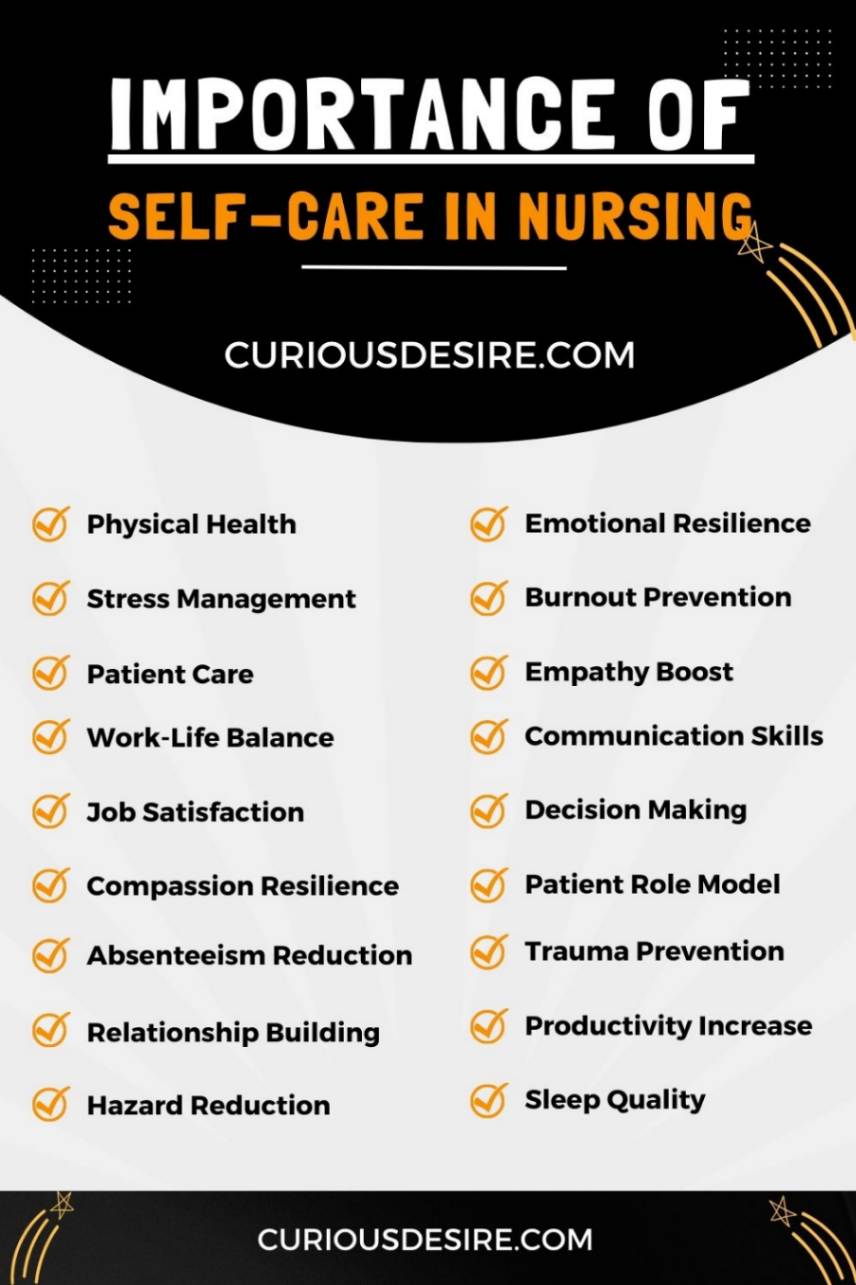Self-care in nursing is the practice of prioritizing one’s own physical, emotional, and mental well-being to ensure the delivery of quality care to patients.
In today’s world, where nurses face increasing demands, complex patient cases, and high levels of stress, self-care has become indispensable.
This article delves into the importance of self-care in nursing, highlighting its significance in maintaining optimal performance, preventing burnout, and promoting a culture of well-being in healthcare settings.
We will explore 20 key reasons why self-care is vital for nurses, ranging from physical well-being maintenance to sustainable career longevity, and provide insights into how nurses can incorporate self-care practices into their daily lives to thrive personally and professionally.
Here are the 5 common reasons for the importance of self-care in nursing:
- Physical Well-being Maintenance
- Emotional Resilience Enhancement
- Stress Reduction and Management
- Prevention of Burnout
- Improved Patient Care
1. Physical Well-being Maintenance
Physical well-being maintenance is important in nursing as it directly impacts the ability to provide quality care to patients.
When nurses prioritize their physical health, they ensure they have the energy and stamina needed to perform their duties effectively. For instance:
- Regular Exercise: Engaging in physical activity such as walking, jogging, or yoga helps maintain strength and endurance, enabling nurses to handle demanding shifts without feeling fatigued.
- Healthy Eating Habits: Consuming a balanced diet rich in fruits, vegetables, lean proteins, and whole grains provides essential nutrients for optimal functioning and immune support, reducing the risk of illness.
- Adequate Rest: Getting enough sleep is vital for rejuvenating the body and mind, allowing nurses to remain alert and focused during patient care activities.
This not only improves personal job satisfaction but also enhances patient outcomes by ensuring nurses can deliver care consistently and compassionately.
2. Emotional Resilience Enhancement
In addition to its importance in nursing, enhancing emotional resilience equips nurses with the ability to maintain stability and strength in the face of challenging situations.
For instance, nurses frequently encounter emotionally distressing scenarios, such as consoling grieving families or managing patient trauma.
By bolstering emotional resilience, nurses can develop effective coping mechanisms to handle these difficult circumstances.
Techniques like mindfulness and self-reflection can aid in this process, allowing nurses to sustain composure and continue delivering compassionate care to patients.
3. Stress Reduction and Management
Moreover, stress reduction and management are paramount in nursing to ensure nurses maintain their well-being amid the inherent pressures of the profession.
Nursing demands long hours, critical decision-making, and exposure to human suffering, making stress management important.
Nurses can employ various strategies like time management, delegation, and seeking support from colleagues to effectively manage stress.
Additionally, integrating stress-relieving activities into daily routines, such as exercise, relaxation techniques, or hobbies, can provide essential relief.
By proactively managing stress, nurses can sustain their energy levels, prevent burnout, and uphold their commitment to patient care.
4. Prevention of Burnout
Another critical aspect of nursing is preventing burnout, which safeguards nurses’ passion and dedication to their roles.
Prolonged exposure to stress and emotional exhaustion can lead to decreased job satisfaction and compromised patient care.
To mitigate burnout, nurses must prioritize self-care practices such as setting boundaries, taking regular breaks, and promoting social connections.
Engaging in fulfilling activities outside of work, like spending time with loved ones or pursuing hobbies, can also help prevent burnout.
By prioritizing their well-being and recognizing signs of burnout early on, nurses can preserve their mental and emotional health, ensuring they can continue providing optimal care to their patients.
5. Improved Patient Care
Enhancing patient care stands as a cornerstone of nursing, and self-care directly contributes to this endeavor.
When nurses prioritize their well-being, they are better equipped to provide high-quality care to their patients. Here’s how self-care leads to improved patient care:
- Increased Empathy and Compassion: By tending to their own emotional needs, nurses can maintain their capacity for empathy and compassion towards patients, fostering a therapeutic environment conducive to healing.
- Enhanced Communication Skills: Through self-care practices such as mindfulness and stress reduction, nurses can improve their communication skills, ensuring clear and effective interactions with patients, leading to better understanding and adherence to treatment plans.
- Better Decision Making: When nurses prioritize their physical and mental health, they can think more clearly and make sound decisions even in high-pressure situations, resulting in safer and more effective patient care.
- Consistency in Care: Self-care helps nurses manage stress and prevent burnout, enabling them to maintain consistency in care delivery, and ensuring that patients receive the attention and support they need consistently throughout their treatment.
- Role Modeling Healthy Behaviors: By practicing self-care, nurses set an example for patients, demonstrating the importance of prioritizing health and well-being. This can inspire patients to take an active role in their self-care practices, leading to better long-term health outcomes.
6. Enhanced Empathy and Compassion
Nurturing enhanced empathy and compassion in nursing matters greatly as it promotes a deeper connection between nurses and their patients, leading to more effective care.
For instance, a nurse who can empathize with a patient’s fear or pain is better equipped to provide comfort and support during challenging medical procedures.
Nurses can cultivate empathy through active listening, putting themselves in the patient’s shoes, and acknowledging their emotions without judgment.
By enhancing empathy and compassion, nurses create a therapeutic environment where patients feel understood and cared for, ultimately improving their overall experience and healing process.
7. Promotion of Work-Life Balance
The promotion of work-life balance is important in nursing to prevent burnout and ensure sustained job satisfaction.
Nurses often work long hours and face emotionally demanding situations, making it important to strike a balance between professional responsibilities and personal well-being.
For example, prioritizing time for relaxation, hobbies, and spending quality time with loved ones outside of work helps nurses recharge and rejuvenate.
Setting boundaries around work hours and learning to delegate tasks also contribute to a healthier work-life balance.
By promoting work-life balance, nurses maintain their physical and mental health, leading to increased job satisfaction and longevity in their careers.
8. Better Communication Skills
Improving communication skills is vital in nursing as effective communication is the cornerstone of quality patient care.
Clear and concise communication ensures that important information is conveyed accurately between healthcare professionals and patients.
For instance, a nurse with strong communication skills can explain medical procedures, treatment plans, and potential risks to patients in a way that is easily understandable, reducing anxiety and confusion.
Nurses can enhance their communication skills through active listening, using simple language, and non-verbal cues such as eye contact and body language.
By honing their communication skills, nurses facilitate better patient understanding, compliance with treatment, and overall satisfaction with care received.
9. Increased Job Satisfaction
Fostering increased job satisfaction among nurses is paramount as it directly impacts their motivation, engagement, and quality of care provided.
When nurses feel satisfied and fulfilled in their roles, they are more likely to approach their work with enthusiasm and dedication.
For example, a nurse who feels valued and supported by their colleagues and organization is more likely to go above and beyond to meet patient needs.
Employers can promote job satisfaction by providing opportunities for professional growth, recognizing and rewarding achievements, and promoting a positive work culture.
By increasing job satisfaction, nurses experience greater fulfillment in their careers, leading to improved morale, retention rates, and ultimately, better patient outcomes.
10. Prevention of Compassion Fatigue
Preventing compassion fatigue is important in nursing to maintain the ability to provide empathetic and compassionate care to patients without experiencing emotional exhaustion.
Compassion fatigue occurs when caregivers become overwhelmed by the suffering of those they care for, leading to a decline in their ability to empathize and connect with patients.
- Self-awareness: Recognize emotional responses to patient care, addressing feelings of helplessness or detachment promptly.
- Boundaries: Establish clear work-life boundaries to recharge outside of nursing, preventing emotional exhaustion.
- Peer Support: Seek camaraderie and validation from colleagues to combat feelings of isolation and burnout.
- Self-care Practices: Engage in activities like exercise and meditation to replenish emotional reserves and build resilience.
- Supervision and Counseling: Utilize regular supervision and counseling services for processing emotions and managing compassion fatigue effectively.
11. Enhanced Decision Making
Improved decision-making skills are pivotal in nursing as they directly impact patient outcomes and safety.
For instance, during critical situations, nurses must swiftly assess the scenario and make well-informed choices regarding patient care.
Nurses can refine their decision-making abilities by staying abreast of evidence-based practices, seeking advice from experienced colleagues, and regularly reflecting on their practice to identify areas for growth.
By enhancing decision-making skills, nurses ensure patients receive timely and optimal care, leading to improved treatment outcomes and overall satisfaction.
12. Role Modeling for Patients
Serving as role models for patients holds significant weight in nursing, inspiring individuals to adopt healthier behaviors and attitudes toward their well-being.
For example, when nurses prioritize self-care practices such as exercise and stress management, they exemplify the importance of maintaining health and wellness.
Nurses can model healthy behaviors by openly discussing their self-care routines with patients, sharing personal experiences, and offering practical tips for incorporating healthy habits into daily life.
By being positive role models, nurses empower patients to take charge of their health and embrace positive lifestyle changes.
13. Reduced Absenteeism
Mitigating absenteeism among nurses is essential for ensuring continuous patient care and maintaining adequate staffing levels.
When nurses are absent due to illness or burnout, it disrupts care delivery and places additional strain on the remaining staff.
Nurses can curb absenteeism by prioritizing physical and mental health through regular exercise, proper nutrition, sufficient sleep, and stress management.
Promoting a supportive work environment where nurses feel valued and appreciated can further alleviate stress and prevent burnout, ultimately leading to decreased absenteeism rates and heightened staff morale.
14. Strengthened Interpersonal Relationships
Fortifying interpersonal relationships among nursing staff is critical for promoting collaboration, teamwork, and mutual support in the workplace.
Positive relationships create an environment where nurses feel comfortable seeking assistance, sharing knowledge, and collaborating on patient care.
Nurses can strengthen these relationships by actively listening to and respecting their colleagues, offering assistance when needed, and celebrating successes together.
Building robust interpersonal connections enhances communication, fosters trust, and cultivates a cohesive and efficient healthcare team.
15. Prevention of Vicarious Trauma
Preventing vicarious trauma is important in nursing to safeguard against the emotional toll of witnessing others’ suffering.
Nurses often encounter traumatic situations, which can lead to symptoms similar to those experienced by the individuals directly affected.
To prevent vicarious trauma, nurses can implement self-care practices such as mindfulness, seeking professional support when needed, and setting boundaries to maintain emotional well-being.
By prioritizing prevention, nurses can continue to provide compassionate care while protecting their mental health.
16. Increased Productivity
Boosting productivity among nurses is important for optimizing patient care delivery and operational efficiency.
When nurses are productive, they can manage their workload effectively, prioritize tasks efficiently, and deliver care on time.
Nurses can enhance productivity by utilizing time management techniques, organizing their workflow, and delegating tasks appropriately.
Additionally, promoting a supportive work environment that values teamwork and provides resources for professional development can further enhance productivity.
By increasing productivity, nurses can maximize their impact on patient outcomes and contribute to overall healthcare effectiveness.
17. Improved Sleep Quality
Improving sleep quality is paramount for nurses to maintain optimal health and performance on the job. Adequate sleep is essential for physical and mental well-being, affecting mood, cognition, and overall functioning.
Nurses can enhance sleep quality by establishing a consistent sleep schedule, creating a conducive sleep environment free from distractions, and practicing relaxation techniques before bedtime.
Additionally, avoiding stimulants like caffeine and alcohol close to bedtime can promote better sleep.
By prioritizing sleep hygiene, nurses can ensure they are well-rested and alert during shifts, leading to improved patient care and safety.
18. Reduction of Occupational Hazards
Minimizing occupational hazards is vital in nursing to protect nurses from workplace injuries and illnesses.
Nurses face various hazards, including exposure to infectious diseases, ergonomic strains from lifting patients, and workplace violence.
To reduce occupational hazards, nurses can adhere to safety protocols, use proper lifting techniques, and wear appropriate personal protective equipment (PPE) when necessary.
Additionally, participating in ongoing safety training and reporting unsafe conditions can contribute to hazard reduction.
By prioritizing safety measures, nurses can mitigate risks and maintain their well-being while providing care to patients.
19. Enhanced Self-awareness
Developing enhanced self-awareness is important for nurses to manage their roles effectively and maintain personal well-being.
By cultivating self-awareness, nurses gain insight into their emotions, strengths, and limitations, allowing them to make informed decisions, manage stressors, and promote resilience in the face of challenges.
Practices such as mindfulness, reflection, and seeking feedback contribute to heightened self-awareness, allowing nurses to better understand their reactions to patient care situations and prioritize self-care strategies accordingly.
20. Sustainable Career Longevity
Ensuring sustainable career longevity is important for nurses to maintain their passion, dedication, and effectiveness in the profession over time.
By adopting practices that promote physical, emotional, and professional well-being, nurses can sustain their careers and continue to provide high-quality care to patients.
Strategies such as ongoing education and skill development, work-life balance initiatives, and prioritizing self-care contribute to long-term career sustainability by preventing burnout, enhancing job satisfaction, and promoting a sense of purpose and fulfillment in nursing practice.
Prioritizing career longevity not only benefits individual nurses but also strengthens healthcare systems by retaining experienced and skilled professionals who contribute to improved patient outcomes and overall healthcare quality.
Conclusion
In conclusion, self-care is not just a luxury but a necessity for nurses in today’s fast-paced healthcare environment.
By prioritizing their well-being, nurses can ensure they have the energy, resilience, and compassion needed to provide the best possible care to their patients.
From maintaining physical health to preventing burnout and promoting strong interpersonal relationships, self-care plays a vital role in sustaining a fulfilling and sustainable nursing career.
By embracing self-care practices, nurses not only enhance their own lives but also contribute to a healthier, more resilient healthcare system overall.
Importance of Self-Care in Nursing FAQs
1. What is self-care in nursing?
Self-care in nursing refers to prioritizing one’s own physical, emotional, and mental well-being to maintain optimal health and performance while delivering patient care.
2. Why is self-care important for nurses?
Self-care is important for nurses as it helps prevent burnout, enhances job satisfaction, and ensures the ability to provide quality care to patients over the long term.
3. How can nurses practice self-care?
Nurses can practice self-care by engaging in activities such as regular exercise, mindfulness meditation, seeking social support, and setting boundaries between work and personal life.
4. What are the benefits of self-care in nursing?
The benefits of self-care in nursing include reduced stress, improved emotional resilience, increased job satisfaction, and better patient outcomes due to the provision of attentive and compassionate care.
5. How does self-care contribute to patient care?
Self-care contributes to patient care by ensuring nurses are physically and emotionally well-equipped to provide high-quality care, maintain empathy, and make sound decisions in challenging situations.
6. What are some common self-care practices for nurses?
Common self-care practices for nurses include adequate sleep, healthy eating habits, regular exercise, mindfulness techniques, setting boundaries, and seeking support from colleagues or counseling services when needed.
7. How can nurses incorporate self-care into their busy schedules?
Nurses can incorporate self-care into their busy schedules by prioritizing self-care activities, scheduling regular breaks, delegating tasks when possible, and advocating for a supportive work environment that values well-being.
8. What are the long-term effects of neglecting self-care in nursing?
Neglecting self-care in nursing can lead to burnout, compassion fatigue, decreased job satisfaction, and compromised patient care quality, ultimately impacting both the nurse’s well-being and the effectiveness of healthcare delivery.


